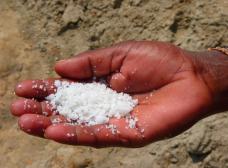Are you a supertaster or addicted to salt?
The intensity with which we experience a salty or bitter taste may very well explain why it’s so difficult for South Africans to shake the salt habit, which has come under the spotlight again in the wake of National Salt Awareness Week (20 to 26 March).
This notion was confirmed by a study conducted by Penn State College of Agricultural Sciences in the US which linked people’s sense of taste directly to how much salt they consumed.
So, if you’re among the many South Africans that find themselves reaching for the saltshaker at every mealtime, you may very well be a ‘supertaster’ – someone who has a heightened sense of taste.
Nicole Jennings, spokesperson for Pharma Dynamics – a prevention-minded pharmaceutical company that promotes a diet low in sodium via its Cooking from the Heart campaign – explains that supertasters often tend to use more discretionary salt (the amount of salt we add to food ourselves) even though they are more sensitive to it, because they’re trying to compensate for the bitter taste the palate picks up when eating certain foods such as cheddar cheese or olives for example. “Salt in general helps to cancel out the bitterness in food. Conversely, the so-called ‘non-tasters’ that participated in the study, had a neutral sense of taste and were less inclined to add additional salt.
“This puts a completely different spin on the entire salt debate since it’s more than just a bad habit that needs to be reviewed. What we like to eat or what tastes good to us largely drives what we do eat at the end of the day and if supertasters mask certain tastes by adding more salt, they may find it much more challenging than others to follow a low-salt diet,” explains Jennings.
Currently, SA’s discretionary salt consumption is in the region of 40% a day, which may indicate that many South Africans have been dealt the ‘supertaster’ gene, since in most other Westernised countries, the discretionary use of salt is in the region of 15%, which points to a more neutral sense of taste.
“The problem with consuming too much salt though,” says Jennings, “is that it increases blood pressure and is therefore indirectly responsible for many heart attacks and strokes. In our country, 215 South Africans die every day from heart disease or stroke, which can be reduced if salt consumption is curbed. Experts estimate that limiting salt consumption could decrease 11% of deaths from heart disease per year and save the SA government in the region of R713-million per annum in healthcare fees.
“While the National Department of Health (NDoH) has introduced legislation around salt reduction in food – which is a step in the right direction – it doesn’t address people’s discretionary salt use. Salt consumption in SA still remains alarmingly high with most adults ingesting as much as 40g a day, which is way above the World Health Organisation’s recommended intake of less than 5g a day,” she flags.
But if you’re challenged by the TAS2R38 receptor gene (that intensifies bitter tastes) what’s a supertaster to do?
Jennings says besides the growing body of evidence which seems to suggest that the TAS2R38 supertaster gene is more prevalent in Africa, there is hope. “Supertasters could train their taste buds by shifting their sense of taste to enjoy foods made with less sodium by using natural herbs and spices instead of salt to achieve the desired taste. I would recommend using fresh garlic, basil, dill, oregano, lemon or red pepper flakes as alternatives to salt.”
According to her there are various ways to determine whether you have the supertaster gene.
“The simplest is to dye your tongue blue with some food colouring and to then stick a hole reinforcer (those white round stickers used to reinforce the holes made in paper when placing them in a file) on your tongue. Then use a magnifying glass and get someone to count the pink bumps on your tongue within the ring reinforcer. If you have more than 35 pink bumps (papillae) within the ring reinforcer, you’re likely to be a bona fide supertaster. If you have between 15 and 35 papillae, you are an average taster. Anything under 15 makes you a non-taster,” she concludes.
Low sodium recipes with great salt-swapping tips, can be found at www.cookingfromtheheart.co.za. The more than 100 heart-healthy recipes all carry the Heart and Stroke Foundation’s stamp of approval and tastes great. The Cooking from the Heart initiative forms part of Pharma Dynamics’ on-going drive to promote healthy eating among the South African public as a way to reduce chronic diseases of lifestyle such as hypertension and heart disease.













0 Comments